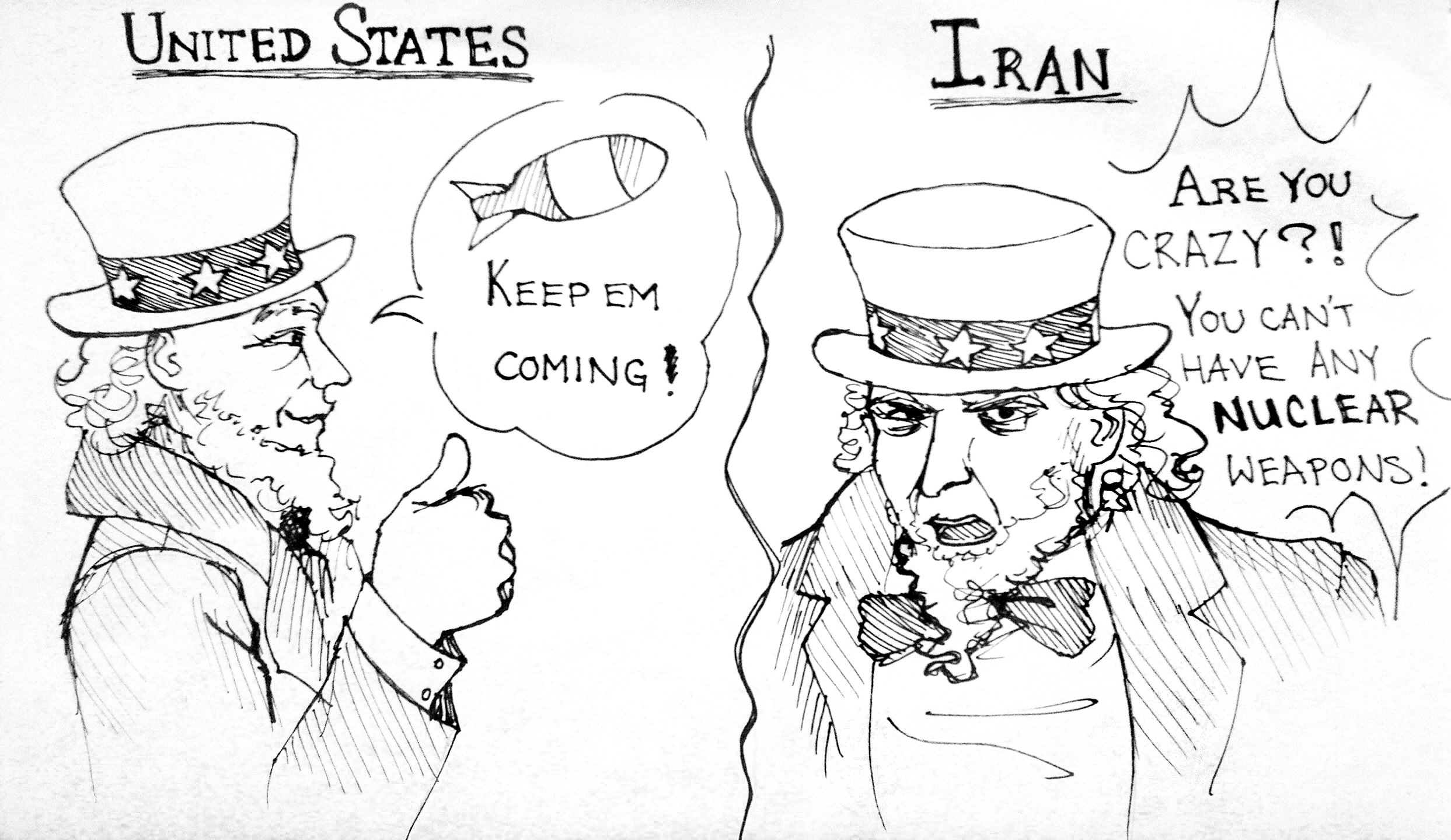The United States should approach Iranian proliferation through a lens of pragmatism and utilitarianism. Pragmatic action towards Iran means the United States has to change its perception of the Iranian Government. That means that rather than looking at Iran as a terrorist government, in order to create a peaceful international order, viewing Iran as a rational actor can and will facilitate the process of peace. In order to do this, the United States needs to realize three things: Iranian proliferation now is slow, inevitable and stabilizing.
In the history of nuclear weapons, the only country to ever utilize one is the United States in 1945 at the end of World War II. President Truman ordered the first and only atomic bombs to be launched against Hiroshima and Nagasaki so the war would come to end. Though there are arguments on both sides as to whether or not this was ethical, the casualties were tremendous and the sorrow thousands of innocent Japanese people experienced is unfathomable. It is hypocritical of the United States to tell another country not to proliferate, considering no damage has been or will be done. Proliferation rhetoric and condemnation is counterproductive and creates a self-fulfilling prophecy. Telling other countries not to do something by a state who has endorsed such actions in the past will just increase the chances of a calamity (such as a nuclear war in the Middle East). This argument is empirically proven and continues to be proven in the status quo. The United States currently has a “no tolerance” policy towards countries that are proliferating (Iran, North Korea) and continue to engage in political and economic sanctions. All these sanctions have done is increase the amount of proliferation by states and muddle relations between the United States and Iran.
The United States’ current justification for condemning Iranian nuclearization is that it poses an external threat to the well-being of all countries. This kind of security logic is what justified the war in Iraq – an empirical example that parallels what may happen with Iran. In order to justify intervention in Iraq, the United States claimed that the Iraqis had weapons of mass destruction. The difference between Iran and Iraq is that Iraq obviously did not have WMDs and intervention resulted in an unnecessary and illogical war in the Middle East. This could potentially happen with Iran, especially if the United States tries to find cheap oil there. The more the Obama Administration rejects Iran’s attempt to increase their nuclear arsenal, the more likely a war will emerge. It is fairly obvious that Iran will not stop what they are doing just because the United States (who is an ally of one of their biggest enemies, Israel) finds it problematic, therefore the only pragmatic way to approach the situation is to realize that proliferation can enhance peace and will change the way in which countries engage in international relations.
It would be more beneficial for the United States to view Iran as a rational actor. To assume that Iran is irrational and will preemptively attack other countries is inherently hypocritical and promotes Islamophobia. This type of discourse was prevalent during the Clinton and Bush administration and only led to more violence. It is important that the Obama Administration realizes that the they cannot afford doing the same things that previous administrations have done, otherwise nuclear war is more likely. Additionally, preventing Iran from building up their own nuclear arsenal for the purposes of “safety” and “security” is problematic.
Iranian proliferation is slow and stabilizing in the status quo. Many experts argue that Iran proliferating will result in other Middle Eastern countries (who are allys of Iran) to do the same. This may be true but it is not necessarily a bad thing. It’s very perplexing as to why the automatic assumption made by the West is that the bombs will be used to destroy ideologically opposed countries – shouldn’t all countries be given the right to protect themselves under any circumstance? Iran claims to be using the nuclear fissle material for the purposes of increasing the amount of energy on the grid, and even if that’s not true, it’s not like they are using it just for the purposes of striking an enemy (see: mistranslation of President Ahmadinejad’s statement about “whiping Israel off of the planet”). Additionally, history is instructive in the context of escalation. In the past 67 years, we’ve had 12 nuclear states (proliferating states) and there has been no barriers against peace. This statistic shows that nuclear proliferation is slow and expensive; proliferation is much more likely to have diplomatic consequences than military ones considering it has only had military consequences once and continues to muddle relations between multiple countries.
Proliferation, especially in the context of Asia, is good for four reasons. First, proliferation has resulted in peace and stability in Asia. It has not changed the distribution of power between countries and has helped weaker countries have a more fair chance. Second, the consequences of a nuclear exchange will never outweigh the logic of keeping weapons contained. According to the doctrine of Mutually Assured Destruction, there is not an incentive to engage in a nuclear war because the result will leave all countries without anything. Even if there is a nuclear exchange between two countries, it will most likely be contained because there is not an incentive to globalize it. Third, for the sake of detterence, proliferation is helpful. Use of proliferation as a means of deterring countries enhances stability among major global powers while simultaneously avoiding arms races like that of the Cold War. Finally, nuclear weapons can have a stabilizing effect and can reorder international relations. More specifically, having nuclear weapons in Iran evens out the playing field between nations. It would be unfair for the United States and other non-Middle Eastern countries to be able to proliferate, leaving the Middle East technologically behind.
The United States should realize that the upkeep of the bomb will become problematic for Iran and may eventually result in disarmament. This view is a more progressive one for it is coupled with a change in perception towards Iran by the United States. It is also one that will only help US-Iran relations, considering their history. Increasing relations can help create peace between the West and the Middle East, because who is the United States to tell anyone else not to build a bomb to protect themselves?
Though tensions are high between Iran and the United States, what the United States is doing clearly isn’t working, so the only thing left to do is to put trust in Iran’s rationality and hope to increase diplomatic ties through this new-found perspective. We are living in the 21st century and it’s only fair to let all countries keep up with the technological advances that happen everyday.
Asst. Editorials Editor Priyanka Krishnamurthy is a College sophomore from Coppell, Texas.
The Emory Wheel was founded in 1919 and is currently the only independent, student-run newspaper of Emory University. The Wheel publishes weekly on Wednesdays during the academic year, except during University holidays and scheduled publication intermissions.
The Wheel is financially and editorially independent from the University. All of its content is generated by the Wheel’s more than 100 student staff members and contributing writers, and its printing costs are covered by profits from self-generated advertising sales.





It is logic like this that would have made the case for Hitler possessing nuclear power.
Maybe Pol Pot should have had one too.
Let’s overlook the obvious. Hitler, Pol Pot, Anmadinejad are leaders that should never have (or had) nuclear weapons at their disposal.
To insinuate that Harry Truman is somehow like Ahmdainejad is both disingenuous and plain stupid.
The 1st comment is right. Ahmadinejad and Truman are nothing alike. Ahmadinejad has never dropped atomic bombs (that’s plural) on thousands and thousands of civilian targets in civilian cities, nor has he ever instigated a conflict around the world, far from his own country, resulting in little accomplishment other than hundreds of thousands of deaths. Forgot about that little Korean War, didn’t we?
Silly me. I guess I need to be more literal.
Truman stood up for freedom as codified in our Bill of Rights. I suppose you would have preferred surrendering to Imperialist Japan, but if done so you would have never have had the freedom to write your comment. Mere details, I suppose.
You might ask the grandchildren of the gang-raped victims of Imperialist Japan what they would have suggested Truman do. Pearl Harbor-like military actions were not forcing the Japanese hands so Truman chose to do something that would end the madness. If he could have used a drone missile to target the Imperialist leaders, no doubt you would have found that equally troubling.
Ahmadinejad, in contrast, stands up for Sharia law which codifies hatred of all non-Muslims, imprisonment for those who write comments criticizing him, Islam or the state. It appears you prefer totalitarianism over the freedoms Truman was forced to defend and to make actual hard decisions about. In any case, I doubt you’ve ever been forced to make a hard decision and are, instead, one of those people who prefer judging those who do.